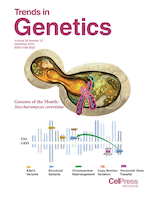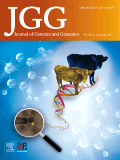
Human Gene
metrics 2024
Pioneering Research in Genetics and Health
Introduction
Human Gene is an innovative open access journal published by ELSEVIER, dedicated to the ever-evolving field of genetics. Established in 2022, this journal serves as a vital resource for researchers, professionals, and students alike, aiming to facilitate the dissemination of groundbreaking research and advancements in both basic and clinical genetics. With an ISSN of 2773-0441, Human Gene focuses on providing a platform for high-quality studies that investigate genetic mechanisms, their implications in health and disease, and novel therapeutic strategies. The journal currently holds a Q4 ranking in both Genetics and Clinical Genetics categories, reflecting its emerging status within the scientific community, and strives to enhance its impact to better serve an engaged audience. With its base in Amsterdam, Netherlands, Human Gene is committed to making research accessible through its open access model, inviting contributions that advance our understanding of human genetics and foster collaboration across disciplines.
Metrics 2024
 0.23
0.23 0.50
0.50 0.50
0.50 28
28Metrics History
Rank 2024
Scopus
IF (Web Of Science)
JCI (Web Of Science)
Quartile History
Similar Journals

MOLECULAR GENETICS AND GENOMICS
Championing Cutting-Edge Discoveries in GeneticsMOLECULAR GENETICS AND GENOMICS is a distinguished journal published by SPRINGER HEIDELBERG that serves as a pivotal platform for the communication of cutting-edge research and developments in the fields of genetics, molecular biology, and medicine. With an ISSN of 1617-4615 and an E-ISSN of 1617-4623, this journal has established itself since its inception in 1994 as a significant resource for researchers aiming to explore the complexities of genetic interactions and their implications in various biological systems. The journal is indexed in Scopus, with respectable rankings in the Genetics, Molecular Biology, and Biochemistry categories, showcasing its position within the academic community. It is categorized in the 2023 rankings as Q3 in Genetics, Q2 in Medicine (miscellaneous), and Q3 in Molecular Biology, indicating its relevance and quality in the scientific discourse. The journal also promotes open access, ensuring that researchers and professionals can easily share and advance knowledge in the rapidly evolving disciplines of molecular genetics and genomics. As the journal continues to bridge the gap between experimental and theoretical research, it presents a vital space for innovation, fostering collaborations and scholarly exchange among its readership.

Gene Reports
Catalyzing Innovations in Genetic StudiesGene Reports is a prominent academic journal published by Elsevier that focuses on the rapidly evolving field of genetics. Launched in 2015, this journal serves as a pivotal platform for the dissemination of cutting-edge research, bridging the gap between basic and applied genetics studies. Although it currently holds a Q4 ranking in the Genetics category and stands at the 248th position out of 347 in Scopus rankings, its potential for growth is significant given the increasing interest in genetic research across various disciplines. With an E-ISSN of 2452-0144, Gene Reports aims to provide open access to original research articles, reviews, and short communications that advance the collective understanding of genetic mechanisms and their applications. As a publication that continues to shape the future of genetics, it is an essential resource for researchers, professionals, and students seeking to stay informed about the latest developments in this crucial field.

Genes and Nutrition
Exploring the Nexus of Nutrition and GeneticsGenes and Nutrition is a prominent open access journal published by BMC in the United Kingdom, dedicated to advancing knowledge at the intersection of nutrition, genetics, and human health. With the aim of making cutting-edge research available to a global audience, the journal has been a vital platform for sharing discoveries since its inception in 2007, and it continues to thrive with a convergence period extending to 2024. Recognized for its high-quality contributions, Genes and Nutrition is rated in the Q2 category within both Endocrinology, Diabetes, and Metabolism and Genetics as of 2023, reflecting its esteemed position in these fields (Scopus Ranks leaderboard places it at #72/244 and #109/347, respectively). This journal is an invaluable resource for researchers, professionals, and students alike, fostering collaboration and innovation in the understanding of how genetic factors influence nutrition and health outcomes. Accessible to all since 2016, it encourages dialogue and discovery, positioning itself as a leader in genetic and nutritional science.

RUSSIAN JOURNAL OF GENETICS
Connecting Researchers through Genetic InnovationsRUSSIAN JOURNAL OF GENETICS is a significant platform in the field of genetics, published by PLEIADES PUBLISHING INC since its inception in 1996. With an ISSN of 1022-7954 and an E-ISSN of 1608-3369, the journal focuses on a wide array of topics within genetics, providing researchers, professionals, and students with insights into advancements and discoveries in this ever-evolving discipline. While it currently holds a Q4 ranking in the 2023 Genetics category according to Scopus, representing invaluable opportunities for knowledge dissemination, the journal is actively working to enhance its impact in future rankings. Readers will find the journal a repository of diverse genetic research findings, methodologies, and theoretical advancements. Although it is not an open-access journal, it is committed to serving the academic community through rigorous peer-reviewed articles. With a consistent publication trajectory spanning to 2024, the RUSSIAN JOURNAL OF GENETICS remains a crucial resource for those aspiring to stay at the forefront of genetic research and applications.

GENES & GENETIC SYSTEMS
Shaping the Future of Genetic Science and MedicineGENES & GENETIC SYSTEMS, an esteemed journal published by the Genetics Society of Japan, serves as a vital platform for the dissemination of innovative research within the fields of genetics, molecular biology, and medicine. Established in 1996 and based in Mishima, Shizuoka, Japan, this journal has actively contributed to the academic community, fostering collaboration and knowledge sharing among researchers and professionals. The journal’s impact can be seen through its category quartiles, which reflect its position in Genetics, Molecular Biology, and Medicine, and while it currently ranks in Q4 in Genetics and Q3 in Medicine (miscellaneous), it is poised for growth as it continues to publish pivotal studies. With a commitment to open access, GENES & GENETIC SYSTEMS ensures that research findings are freely accessible to the global scientific community, promoting a more inclusive approach to knowledge distribution. This journal is essential for students, researchers, and professionals seeking to stay informed of advancements in genetic research and its implications for the broader field of medicine.

JOURNAL OF NEUROGENETICS
Charting New Territories in the Study of NeurogeneticsJOURNAL OF NEUROGENETICS, published by Taylor & Francis Ltd in the United Kingdom, is an influential platform for research and discussion in the dynamic field of neurogenetics. With an ISSN of 0167-7063 and an E-ISSN of 1563-5260, this journal has been committed to advancing our understanding of the genetic underpinnings of neurological conditions since its inception in 1983. Presently categorized in the Q3 quartile for Cellular and Molecular Neuroscience and Q2 for Genetics as of 2023, it serves as an essential resource for researchers and professionals seeking insights into the genetic factors influencing nervous system function and disorder. Although it does not offer open access, the journal remains a critical repository of knowledge with a broad scope that invites contributions spanning molecular genetics to neurobiology. With its rankings in Scopus reflecting a keen focus on robust academic standards, the JOURNAL OF NEUROGENETICS is vital for those dedicated to pioneering research and finding solutions in neurogenetics, making it a significant asset to students, scholars, and industry experts alike.

HUMAN GENETICS
Illuminating the path to genetic understanding.HUMAN GENETICS, published by SPRINGER, stands as a cornerstone journal in the field of genetics, offering a wealth of research insights since its inception in 1964. Hailing from Germany, this esteemed journal boasts an impressive Q1 ranking in both Genetics and Clinical Genetics, marking it among the top quartile of journals in these categories for 2023. With a notable Scopus rank of #7 in Clinical Genetics and a percentile ranking of 93, HUMAN GENETICS attracts significant attention from researchers and professionals dedicated to advancing our understanding of genetic influences on human health and disease. Although it does not currently offer Open Access options, the journal provides a critical platform for scholarly communication, aimed at disseminating groundbreaking findings in genetics and biotechnology. As the field evolves, HUMAN GENETICS continues to play an instrumental role in bridging the gap between laboratory research and clinical application, making it an essential resource for students and seasoned researchers alike.

TRENDS IN GENETICS
Shaping Tomorrow's Genetic Discoveries TodayTRENDS IN GENETICS, published by CELL PRESS, is a leading journal in the field of genetics, recognized for its significant impact on research and advancements in the discipline. With an impressive Scopus ranking of #10 out of 347 in the category of Genetics and a 97th percentile ranking, this journal stands as a premier platform for publishing innovative, high-quality articles that shape the future of genetic research. Since its inception in 1985, TRENDS IN GENETICS has been at the forefront of the genetic sciences, continuously disseminating crucial findings while maintaining a strong commitment to scientific rigor and integrity. Although it does not currently offer open access options, its rigorous peer-review process ensures that only the most relevant and groundbreaking studies make it to publication. Scholars and practitioners in genetics will find this journal to be an invaluable resource for keeping abreast of the latest developments, trends, and methodologies that drive the field forward.

Journal of Genetics and Genomics
Connecting Researchers in the Genetic LandscapeThe Journal of Genetics and Genomics, published by SCIENCE PRESS in China, stands as a significant contributor to the fields of Genetics and Molecular Biology. With an ISSN of 1673-8527 and E-ISSN 1873-5533, this esteemed journal has achieved a remarkable reputation, holding a prestigious Q1 ranking in both Genetics and Molecular Biology as of 2023. This journal not only showcases pioneering research but also fosters vital discussions on contemporary challenges and innovations within genomic sciences. As part of its commitment to facilitating scientific advancement, the journal encompasses a range of research articles, reviews, and short communications, all aiming to illuminate the complexities of genetic structures and functions from 2007 to 2024. Researchers, professionals, and students alike are encouraged to engage with its content, which ranks favorably in Scopus—placing it within the top tier of its categories. Join the community of academic excellence and explore the latest findings that shape our understanding of genomics.

Molecular Genetics & Genomic Medicine
Advancing the frontiers of genomic medicine.Molecular Genetics & Genomic Medicine, published by WILEY, is an esteemed and open-access journal that has been a prominent source of knowledge in the fields of genetics and molecular biology since its establishment in 2013. With an ISSN of 2324-9269, it aims to provide a platform for the dissemination of novel findings and innovative research that pushes the boundaries of genomics and its clinical applications. The journal holds a Q3 categorization in Genetics, Clinical Genetics, and Molecular Biology, reflecting its growing influence in these disciplines, as evidenced by its Scopus rankings. Researchers, professionals, and students alike will find valuable insights and advancements in genomic medicine, making this journal an essential resource for those dedicated to the understanding and application of genetic and molecular research in healthcare. Located at 111 River St, Hoboken, NJ, Molecular Genetics & Genomic Medicine continues to foster a global dialogue within the scientific community, ensuring accessible knowledge for all.